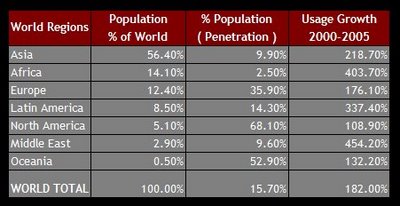Knowledge vs Wisdom vs The Enterprise
What are the leaders and shakers thinking these days? How is the new world of social networking, individualistic journalism and Web 2.o affecting them?
Here’s the deal: contrary to popular belief, there’s no such thing as a organization or a company - product company, telecom company, international organization, consulting company or a retail company. All companies are people companies. All collectives are people collectives.
People make products for people. People serve people. People work with people and for people. I’d venture a guess that the root cause of business problems is not financial, not product-related and not structure-related. Businesses live and die by its executives' and employees’ talents, levels of empathy and ability to play well with others… and by their willingness to listen and acknowledge that customers (also people) just may have some valuable input.
If an orgaization is rife with internal politics, fiefdoms and one-upmanship, I doubt that it will be successful in this new customer-centric era. If a company’s employees aren’t successful in their personal relationships at home, it can’t become a successful people company.
The solution is not a new business model: or organizational model: it’s a new people model.
We don’t need a new ad campaign or a new org chart. There are no quick fixes. The skill sets needed in today’s times are not management consultants or marketing specialists. If we’re all really honest with ourselves, what we really need are psychologists and coaches and relationship experts. We’re talking about real people connections, not a personalized direct mail piece.
And this is why blogging and other social technologies have exploded onto the scene.
Over the past few decades, we’ve lost the humanity of organizations. With the advent of mass-produced global one-size-fits-all cookie-cutter solutions and multi-dimensional geometric org charts and 24/7 relocation and nuclear, non-nuclear, secular families, we’ve forgotten our ability to relate and connect.
How do we expect an organization to build relationships with people when most of us have difficulty making genuine connections with anyone? So we can keep talking about the importance of employee focus, transparency and co-management but we’ll never get there until we recognize that it’s not that easy to overturn decades of organizational depersonalization.
We may have to make some difficult choices: letting go of talented employees who are more focused on being right than being empathetic; moving to a new job at a company that fosters a relationship culture; taking a risk and going out on your own. I’m sure that part of the free-agent trend stems from a rebellion against the dehumanization of organizations.
Web 2.0 and the Enterprise? C'mon - who are we kidding?
We can't turn back time - to a time of community marketplaces, bazaars, neighbourhood shops and pubs where everyone knew your name, and town squares. Or going back further still to trading posts and tribal campfires.
Or can we?
Let’s start and focus on who we can influence and what we can do in our own sphere. Let’s start where we are. Let's start with the person in the next office but let's not stop there. We can use Web 2.0 in the office if we can do Web 2.0 in oerson. Offline comes before online. That lesson has been taught over and over.
Creating a social enterprise is a pre-requisite to attend the global classroom. Remember - knowledge does not equal wisdom. Knowledge is flat. Wisdom is knowledge experienced. Wisdom creates value.
So let's spread the wealth.


 Handbook for bloggers and cyber-dissidents (PDF 1.2 MB)
Handbook for bloggers and cyber-dissidents (PDF 1.2 MB)